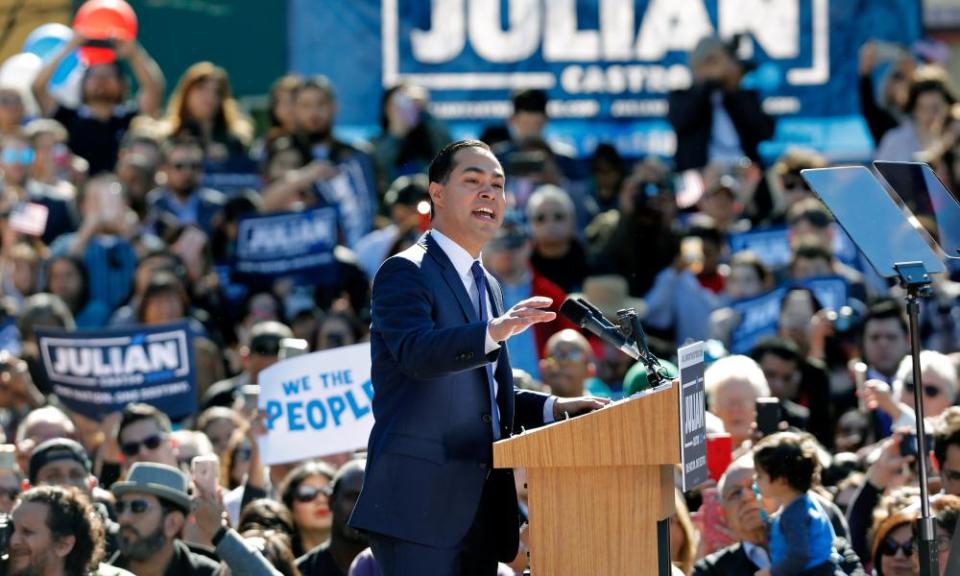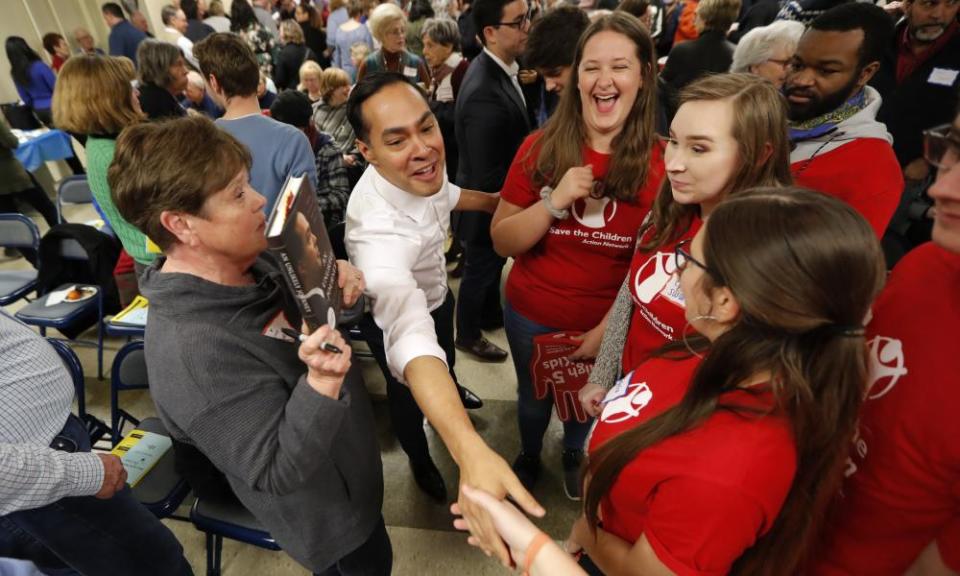Julián Castro: the US should launch a Marshall plan in Central America

The US should launch a 21st-century Marshall plan in Central America to help stricken countries combat gangs and poverty to stem the flow of undocumented immigrants to America’s southern border, the Democratic presidential candidate Julián Castro has proposed.
Related: Who's running in 2020? The full list of Democrats vying to take on Trump
Castro, a former mayor of the Texas city of San Antonio and cabinet member under Barack Obama, is calling for the US to emulate Harry Truman’s 1948 aid program that helped western Europe recover from the ravages of the second world war. In a modern echo, the US would inject resources and knowhow into the struggling societies of Central America as a humane alternative to Donald Trump’s proposed wall.
In an interview with the Guardian, Castro said that his proposal for a new Marshall plan would stand in contrast to the cruelty of Trump’s immigration crackdown.
“Extending a hand of friendship, of opportunity to countries in our hemisphere – this approach is much more in keeping with our values,” he said. “This is a mutually beneficial way to engage Central Americans, not a slap in the face like the wall.”
Speaking to the Guardian in Austin, Texas, Castro said that his investment program would be focused on the so-called northern triangle countries of El Salvador, Guatemala and Honduras that have provided the bulk of undocumented immigrants seeking to enter the US illegally in recent years. But he added there would also be attention given to Mexico and other emerging economies such as Brazil.
This is a mutually beneficial way to engage Central Americans, not a slap in the face like the wall
Julián Castro
“Throughout our history the United States has benefited form having stronger relationships, including investments in Europe, that have kept us and the world safer and benefited us economically. I believe it’s time to look at Latin America in the same way.”
Castro has yet to put flesh on the bones of his Marshall plan, which he said will be developed over the course of this year with the aim to produce a detailed blueprint before the first Democratic poll – the Iowa caucuses on 3 February 2020. Among the elements still to be worked out is the cost, though he said investment would be “bigger than we’ve ever done”.
The US is already providing aid to Central America through the state department. About $2.6bn was committed in financial assistance between 2015 and 2018.
Castro said that part of his mission would be to use the existing resources more effectively. He was critical of the $979m that has been spent since 2008 on the Central America Regional Security Initiative to combat drug trafficking and gangs.
“We need to be more accountable and transparent and actually serve the people of those countries. The US has a checkered history when it comes to some of these Central American regimes – oftentimes strongmen leaders have used the US as a foil to prop themselves up.”

Julián Castro announce his 2020 presidential campaign in San Antonio, Texas, on 12 January.Photograph: Edward A Ornelas/Getty Images
Castro is making his call for an enhanced intervention in Central America at a time when he is trying to motivate Latino voters in the US to back him in the presidential race. With 12 Democratic candidates already announced, Beto O’Rourke unofficially announced, and Joe Biden expected to add his name soon, Castro has been highlighting his credentials as the only Latino in the pack as a way to raise his voice above the crowd.
Castro is son of a Chicana activist, Rosie Castro, and twin brother of congressman Joaquín Castro. He launched his presidential campaign in Puerto Rico and has been spending time in Latino neighborhoods of Iowa.
Related: Julián Castro flips the campaign script: 'I can win in 2020'
He has also embarked on a tour to all 50 states of the union to sell his platform of immigration reform, universal healthcare, investment in public education and a plan to create a commission looking into reparations for African American descendants of slaves.
The issue of how to deal with families of immigrants presenting themselves for asylum at the US border with Mexico or attempting to cross without papers is back in the spotlight as Trump continues to demand that Congress fund his wall. A fresh clash between the White House and Democrats in the House is looming after Trump this week made a new budget request for $8.6bn in wall funding and the Democratic leadership immediately rejected it.
The issue has also been forced up the political agenda by new border figures that put the number of undocumented migrants who crossed the Mexican-US border last month at 76,000, more than double the number from a year ago.
Castro told the Guardian that the surge in border crossers showed how Trump’s hardline approach was not working. “This is a prime example of how much a failure Trump has been on immigration,” he said. “He told us that if we would just be cruel enough to separate little children from their parents that would deter additional families from coming to our country – he couldn’t have been more wrong.”

Julián Castro greets Iowa State University students in Ames, Iowa, on 23 February.Photograph: Charlie Neibergall/AP
The original Marshall plan, named after then US secretary of state George Marshall, was designed to help war-tattered economies in western Europe pick themselves up after the war. Eighteen countries received US largesse, with more than half of the investment going to the UK, France and Germany.
Though the Marshall plan has gone down in history as an example of enlightened US leadership in the world, its scale was relatively modest. It amounted to $12bn – about $125bn in today’s money.
That is not wildly more than the proposed cost of building a wall along the southern US border. Estimates have put the cost of such a barrier at up to $70bn.
But it remains unclear how much investment would be needed to make sufficient difference to the lives of Central American families that they no longer felt the necessity to travel to the US in search of a brighter future. Castro’s home state of Texas alone has a GDP of $1.6tn – more than 20 times the $76bn GDP of Guatemala, the country that accounted for the lion’s share of last month’s border surge.
Related: Julián Castro will not rule out reparations to descendants of slaves
Castro said that some Americans would be inclined to question spending US resources on struggling Central American countries, but argued that once they were informed of the mutual benefits they would come around. “There will be greater stability in this hemisphere, people will find safety and opportunity in their own countries so they won’t knock on the door of the United States, and as China and others strike out in Latin America it makes more sense for us to have stronger relationships.”
The new Marshall plan would form part of Castro’s overall progressive immigration stance. He is pressing for: rapid immigration reform to carve out a pathway to citizenship for all 11 million people living without permission in the country; a radical restructuring of the federal agency Immigration and Customs Enforcement (Ice) to make it more humane; and the beefing up of security at border entry points using new technologies.
On the campaign trail Castro draws from the experiences of his late grandmother who herself crossed into the US from Mexico in 1922 as an orphan. “I can understand the value of the immigrant experience and that we have become the nation that we are because people like my grandmother were able to make a life in this country,” he said.
He added: “Now we need their energy and contributions more than ever.”

